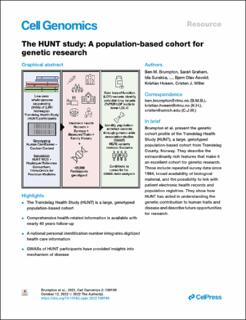The HUNT study: A population-based cohort for genetic research
Brumpton, Ben Michael; Graham, Sarah; Surakka, Ida; Skogholt, Anne Heidi; Løset, Mari; Fritsche, Lars G.; Wolford, Brooke; Zhou, Wei; Nielsen, Jonas Bille; Holmen, Oddgeir Lingaas; Gabrielsen, Maiken Elvestad; Thomas, Laurent; Bhatta, Laxmi; Rasheed, Humaira; Zhang, He; Kang, Hyun Min; Hornsby, Whitney; Moksnes, Marta Riise; Coward, Eivind; Melbye, Mads; Giskeødegård, Guro F.; Fenstad, Jørn; Krokstad, Steinar; Næss, Marit; Langhammer, Arnulf; Boehnke, Michael; Abecasis, Gonçalo R.; Åsvold, Bjørn Olav; Hveem, Kristian; Willer, Cristen J.
Peer reviewed, Journal article
Published version
Permanent lenke
https://hdl.handle.net/11250/3047099Utgivelsesdato
2022Metadata
Vis full innførselSamlinger
Sammendrag
The Trøndelag Health Study (HUNT) is a population-based cohort of ∼229,000 individuals recruited in four waves beginning in 1984 in Trøndelag County, Norway. Approximately 88,000 of these individuals have available genetic data from array genotyping. HUNT participants were recruited during four community-based recruitment waves and provided information on health-related behaviors, self-reported diagnoses, family history of disease, and underwent physical examinations. Linkage via the Norwegian personal identification number integrates digitized health care information from doctor visits and national health registries including death, cancer and prescription registries. Genome-wide association studies of HUNT participants have provided insights into the mechanism of cardiovascular, metabolic, osteoporotic, and liver-related diseases, among others. Unique features of this cohort that facilitate research include nearly 40 years of longitudinal follow-up in a motivated and well-educated population, family data, comprehensive phenotyping, and broad availability of DNA, RNA, urine, fecal, plasma, and serum samples.

